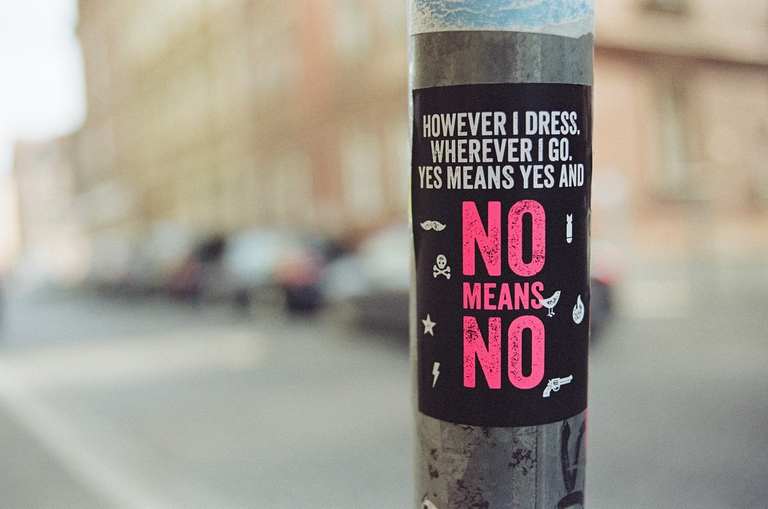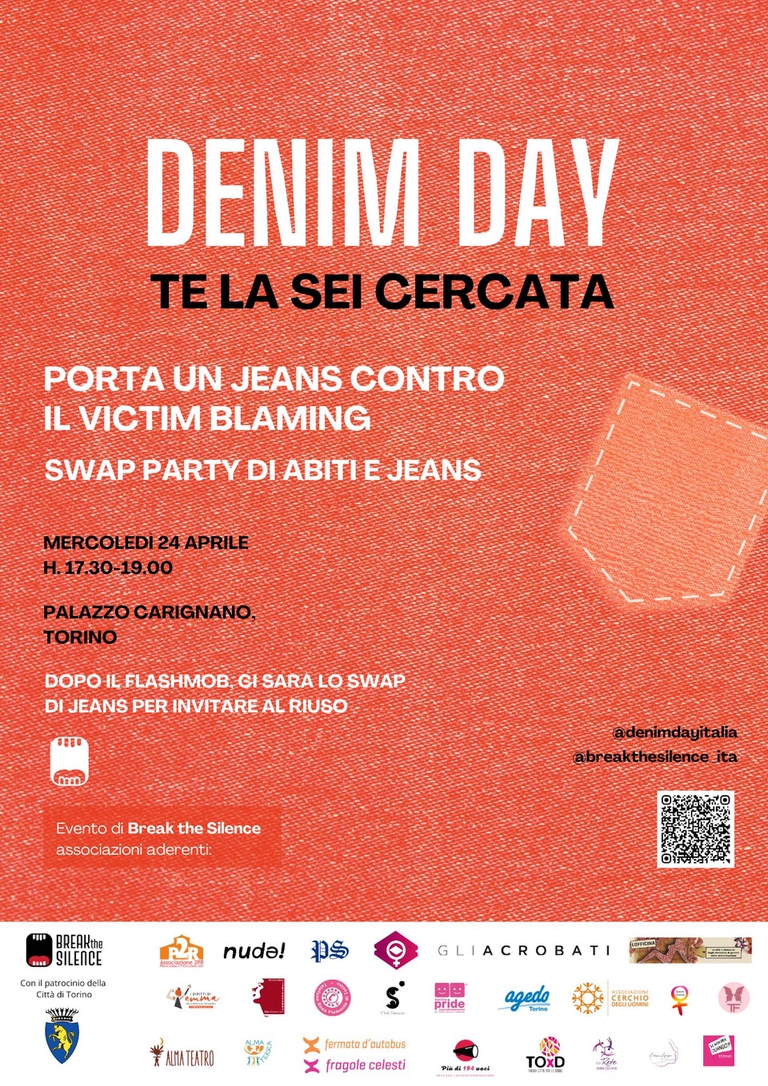https://www.lifegate.it/denim-day-jeans-violenza-genere
- |
- Denim day occurs every third Wednesday in April, a day established in California in 2000 to protest against gender violence.
- Wearing a pair of jeans on April 24th is a way to protest the victim blaming, that is, the habit of pointing out the victim as co-responsible for the violence suffered based on his clothing or behavior.
- The Break the silence organization organizes flash mobs and demonstrations in the squares of the main cities of Italy.
Muro Lucano, province of Potenza, 1992.An eighteen year old girl comes raped by the 45 year old driving instructor during the first lesson.The man, after having her pull over on an isolated street, forces her to get out of the car takes off his jeans and sexually assaults her.Following the girl's complaint, the instructor was first tried and then sentenced, in 1999, to two years and two months in prison.The sentence, however, was overturned by Court of Cassation following the man's appeal:in fact, for the judges there cannot be talk of rape because the girl, at the time of the attack, he was wearing a pair of jeans.Since it was a particularly tight-fitting item of clothing, it would have been impossible for the attacker to remove it without consent.

Denim day, an initiative against victim blaming
Such a baseless motivation immediately arouses reactions from Italian parliamentarians who, in protest, wear jeans in the chamber, an environment where it is customary to wear much more formal clothing.Struck by this story, the Californian Patricia Occhiuzzo Giggans, executive director of the association Peace over violence, decides to scale up the initiative by establishing a Denim day.The first event involves 12 million people and, since 2011, Denim day has been recognized as an institutional day by 20 American states.Since then, the act of wearing jeans is the last Wednesday in April becomes a form of protest against sexual abuse.Since 2000, Denim day has evolved nationally and internationally, becoming an award-winning educational campaign for the prevention of rape, which also counts global brands such as Guess, official sponsor with the Guess Foundation.
The clothing of victims in cases of gender violence is in fact a topic that goes beyond national borders and which, unfortunately, is still more relevant than ever.With the term victim blaming, or secondary victimization, in fact, refers to the process of blaming and blaming the victim, to whom a part of responsibility for the violence to which she was subjected.Consider as relevant from a procedural point of view theclothing that he was wearing, the amount of alcohol who had hired or the number of sexual partners had during life, in fact, means taking into consideration the fact that the victim contributed to the unpleasant event, which “he asked for it”.

Although the sentence that gave rise to the initiative was issued in our country, the campaign linked to Denim day is not so well known in Italy.For a few years, however, the association Break the silence Italy is engaged in organizing flash mobs in the most important cities with the aim of always keeping attention high on “jeans feeling”.Stereotypes and prejudices are in fact far from absent from Italian rape trials. The ECHR, European Court of Human Rights, has repeatedly condemned Italy for the strong prejudices against women expressed by judges and lawyers:such as, for example, the reference to the underwear worn by the victim at the time of the crime, his romantic relationships and the occasional sexual relationships he had during his life.

According to a recent survey conducted by the National Institute of Statistics (Istat), The 39 percent of the population believes that a woman is fully capable of shirk to sexual intercourse if he really doesn't want it.There is also a high percentage of those who are convinced thatclothing of the victim may lead to sexual violence against him:we're talking about 23.9 percent of the population.15 people out of 100 instead think that if the woman is drunk or under the influence of narcotic substances, either in some way co-responsible.Lower, but still alarming, are the percentages of interviewees who maintain that a woman who says "no" actually means "yes" (7.2 percent) and that "serious" women do not happen to be raped (6.2 percent hundred).We then come to the 1.9 percent of Italians who believe that, if a husband or boyfriend forces their wife or partner, it's not about it Of sexual violence.
“Secondary victimization is unfortunately very rooted in our way of thinking” he explains Maria Chiara Cataldo, founder together with Francesca Sapey And Giulia Chinigò of the association Break the silence.“I'll give you an example:It recently happened to me, during a meeting in a school, that the students told me that Giulia Cecchettin he might not have gotten into the car.Which victim, the moment he gets into a car, is thinking of going to die?Moving the finger at the victim means seeking co-responsibility and it is absurd, also because a sort of psychological dependence towards his executioner.A psychologically dependent person comes to trust their abusive partner, but in the common imagination the belief that part of the fault lies with them is deeply rooted, because they could have escaped in some way."
However, the problem does not only extend to ordinary people, but also involves institutions.“A recent ruling by the Supreme Court established that it is rape even when the victim does not react:standing still while being subjected to violence does not mean consenting to the act.But in Italy we are very behind from a legislative point of view.Our penal code speaks of sexual violence only in the negative, referring to what is done under duress or obligation.In Spain, however, we are moving towards having a positive law:that is to say è consensual relationship only when a clear and explicit yes is said, otherwise it is sexual violence.

Break the silence and the victims who feel obliged to justify themselves
“As Break the silence we collect the stories of many girls and we noticed one thing:the victims have the tendency to justify oneself, for how they were dressed or for their behavior when they suffered the violence.This happens because, in Italy, when it comes to the court hearing, an ordeal begins for the victim.As our jurisprudence is set up, the interrogation investigates every single detail to find proof of co-responsibility in the victim.How unbuttoned was the shirt?Had he been drinking or taking drugs?How many sexual partners have you had in the past?In our country one still exists heavy stigma towards sexually active women.The patriarchal culture in which we find ourselves conceives the role of women as primarily confined to caring for the home, husband and children.The sexually active woman must be so towards her partner or husband;the woman who has multiple sexual partners still suffers a moral judgment heavy, both on the part of society and on the part of the institutions.A clear demonstration, for example, is the dismissal some time ago of the Turin teacher whose ex-partner spread intimate photos online:he committed the crime, but she was fired."
Break the silence was born, first as an Instagram page and then as an association, after Francesca Cataldo, during an outing with her friends, was the victim of a very heavy catcalling which alluded to rape.“I decided to share my experience on social media followed by my members and, within a short time, we found ourselves overwhelmed by stories of violence suffered.From there our training course was born, which also involved psychologists and lawyers, to obtain information to share and with which to shape a discussion on the topic.The thing that struck us most immediately, in fact, was precisely the need that the victims felt to justify themselves in order to prove that they had not done nothing wrong“.
“When we discovered the existence of Denim Day, we understood that it was the perfect day for us precisely because all the victims tended to talk about their clothing when they had suffered violence or discrimination,” he continues.“It's okay November 25th because it deals with violence against women in general, the8th of March because it deals with rights, but we also need a day dedicated to how much we, as a society, can contribute to the elimination of gender violence if culturally we stop thinking that the victim asked for it.Because in life you may not be an abusive person but, if with your words you contribute to the culture that sees the victim as guilty party of what he has suffered, you are also part of the problem.Compared to Peace over violence, which simply requires wearing a pair of jeans on the last Wednesday of April, we believed it was more effective to take a step further and therefore organize real activities in squares set up with denim.TO Turin it's the fourth year and now we have expanded to other cities;this year we will be at Perugia, to Bari, to Susa it's at Padua”.
